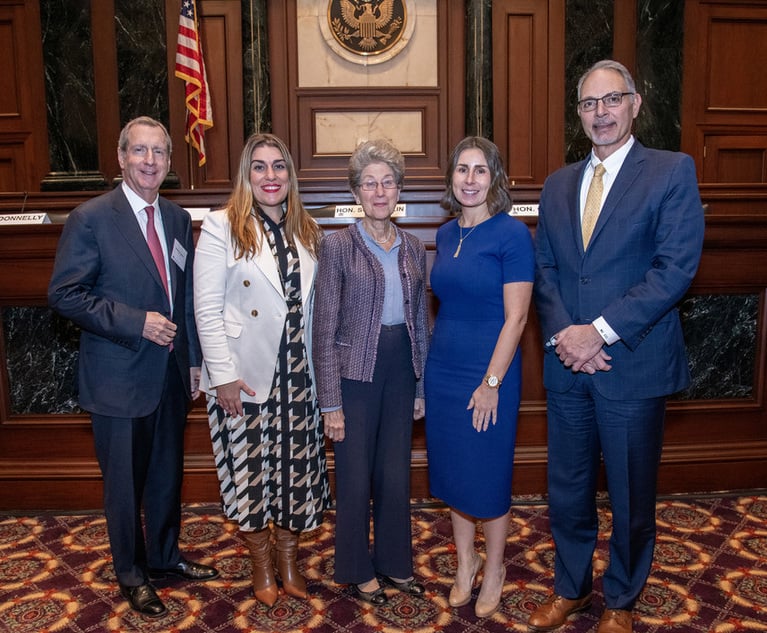 Cisco Systems Inc. corporate headquarters and logo. Credit: Shutterstock.
Cisco Systems Inc. corporate headquarters and logo. Credit: Shutterstock.NY Set to Recoup $1.3 Million in Settlement With Cisco Systems in Cybersecurity Whistleblower Case
The $6 million settlement, of which New York will receive $1.3 million, was part of a larger $8.6 million settlement announced by attorneys for the whistleblower Wednesday.
August 01, 2019 at 11:17 AM
3 minute read
New York is set to recoup $1.3 million in a national settlement with Cisco Systems Inc. of a lawsuit filed in the Western District of New York alleging that the company had sold the states, and the federal government, software that was vulnerable to digital attacks.
New York Attorney General Letitia James announced Thursday that her office had led a coalition of 19 state attorneys general in settling a multistate lawsuit that generated an agreement to pay $6 million to state governments across the country.
Attorneys for the whistleblower, James Glenn, said it’s the first cybersecurity whistleblower case ever successfully litigated under the False Claims Act.
The $6 million settlement was part of a larger $8.6 million settlement announced by attorneys for the whistleblower Wednesday. The remainder will go to the federal government, though Glenn will receive a share of the total settlement, which the FCA prescribes.
The federal law allows a whistleblower to file a qui tam lawsuit, which is essentially litigation that reports fraud and misconduct to the government. Glenn filed his suit in the U.S. District Court for the Western District of New York in Buffalo in 2011.
He’s represented by attorneys from Constantine Cannon and Phillips & Cohen, both of which have offices in New York, Washington, D.C., and San Francisco.
He alleged in the complaint, which wasn’t unsealed until this week, that Cisco knew about flaws in security surveillance system software the company had sold to New York, several other states, and the federal government.
An investigation from several states and the federal government ensued. The New York Attorney General’s Office led the coalition of states involved in the settlement reached this week. James said the litigation showed a “failure” by Cisco.
“Security camera software must be secure — it’s that simple,” James said. “Cisco’s failure to keep their software safe could have endangered the safety of New Yorkers across our state.”
Cisco allegedly knew about the software’s security flaws in 2009, but failed to report them until 2013, after an investigation was launched in response to Glenn’s claims. The vulnerabilities would have allowed attackers to manipulate security cameras and any footage that was recorded, according to the complaint.
The software has since been discontinued, and the investigation conducted by New York and the other states found no evidence that a hack, or any other unauthorized access, ever took place.
The New York Attorney General’s Office conducted the investigation with attorneys general from California, Delaware, Florida, Hawaii, Illinois, Indiana, Massachusetts, Minnesota, Montana, Nevada, New Hampshire, New Jersey, New Mexico, North Carolina, Rhode Island, Tennessee, Virginia, and the District of Columbia.
READ MORE:
This content has been archived. It is available through our partners, LexisNexis® and Bloomberg Law.
To view this content, please continue to their sites.
Not a Lexis Subscriber?
Subscribe Now
Not a Bloomberg Law Subscriber?
Subscribe Now
NOT FOR REPRINT
© 2024 ALM Global, LLC, All Rights Reserved. Request academic re-use from www.copyright.com. All other uses, submit a request to [email protected]. For more information visit Asset & Logo Licensing.
You Might Like
View All
Big Law Partner Presented With State Bar's Scheindlin Award

'A World of Credit': Ex-FTX Executive Gary Wang Sentenced to Time Served Following Cooperation

Manhattan Prosecutors Say They Will Oppose Efforts by Trump Legal Team to Dismiss Case
Trending Stories
- 1GC Conference Takeaways: Picking AI Vendors 'a Bit of a Crap Shoot,' Beware of Internal Investigation 'Scope Creep'
- 2Legal Events for Georgia Lawyers
- 3'There is No Time to Waste': Matt Gaetz Withdraws From AG Nomination
- 4The Growing PFAS Morass: Why Insurance Should Cover These Products Liability Claims
- 5Dallas Jury Awards $98.65M in Botham Jean Killing by Dallas Officer
Who Got The Work
Michael G. Bongiorno, Andrew Scott Dulberg and Elizabeth E. Driscoll from Wilmer Cutler Pickering Hale and Dorr have stepped in to represent Symbotic Inc., an A.I.-enabled technology platform that focuses on increasing supply chain efficiency, and other defendants in a pending shareholder derivative lawsuit. The case, filed Oct. 2 in Massachusetts District Court by the Brown Law Firm on behalf of Stephen Austen, accuses certain officers and directors of misleading investors in regard to Symbotic's potential for margin growth by failing to disclose that the company was not equipped to timely deploy its systems or manage expenses through project delays. The case, assigned to U.S. District Judge Nathaniel M. Gorton, is 1:24-cv-12522, Austen v. Cohen et al.
Who Got The Work
Edmund Polubinski and Marie Killmond of Davis Polk & Wardwell have entered appearances for data platform software development company MongoDB and other defendants in a pending shareholder derivative lawsuit. The action, filed Oct. 7 in New York Southern District Court by the Brown Law Firm, accuses the company's directors and/or officers of falsely expressing confidence in the company’s restructuring of its sales incentive plan and downplaying the severity of decreases in its upfront commitments. The case is 1:24-cv-07594, Roy v. Ittycheria et al.
Who Got The Work
Amy O. Bruchs and Kurt F. Ellison of Michael Best & Friedrich have entered appearances for Epic Systems Corp. in a pending employment discrimination lawsuit. The suit was filed Sept. 7 in Wisconsin Western District Court by Levine Eisberner LLC and Siri & Glimstad on behalf of a project manager who claims that he was wrongfully terminated after applying for a religious exemption to the defendant's COVID-19 vaccine mandate. The case, assigned to U.S. Magistrate Judge Anita Marie Boor, is 3:24-cv-00630, Secker, Nathan v. Epic Systems Corporation.
Who Got The Work
David X. Sullivan, Thomas J. Finn and Gregory A. Hall from McCarter & English have entered appearances for Sunrun Installation Services in a pending civil rights lawsuit. The complaint was filed Sept. 4 in Connecticut District Court by attorney Robert M. Berke on behalf of former employee George Edward Steins, who was arrested and charged with employing an unregistered home improvement salesperson. The complaint alleges that had Sunrun informed the Connecticut Department of Consumer Protection that the plaintiff's employment had ended in 2017 and that he no longer held Sunrun's home improvement contractor license, he would not have been hit with charges, which were dismissed in May 2024. The case, assigned to U.S. District Judge Jeffrey A. Meyer, is 3:24-cv-01423, Steins v. Sunrun, Inc. et al.
Who Got The Work
Greenberg Traurig shareholder Joshua L. Raskin has entered an appearance for boohoo.com UK Ltd. in a pending patent infringement lawsuit. The suit, filed Sept. 3 in Texas Eastern District Court by Rozier Hardt McDonough on behalf of Alto Dynamics, asserts five patents related to an online shopping platform. The case, assigned to U.S. District Judge Rodney Gilstrap, is 2:24-cv-00719, Alto Dynamics, LLC v. boohoo.com UK Limited.
Featured Firms
Law Offices of Gary Martin Hays & Associates, P.C.
(470) 294-1674
Law Offices of Mark E. Salomone
(857) 444-6468
Smith & Hassler
(713) 739-1250







